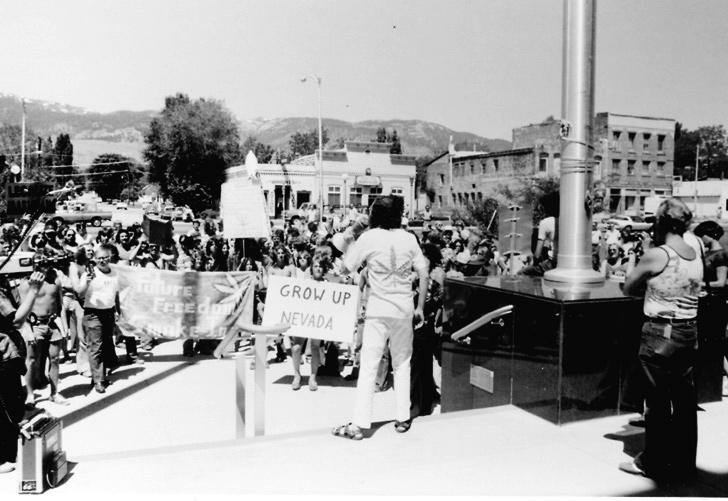
12 minute read
News
from Jan. 3, 2013
School violence in sharp dive
Twenty children were killed at Sandy Hook Elementary School in Connecticut on Dec. 14.
Advertisement
On average, more than 20 children are killed off school grounds every week, all year long.
But both those statistics—children killed in school and children killed overall—are showing sharp declines.
According to the U.S. Bureau of Justice Statistics, “From 1994 to 2010, the rate of serious violent crime occurring on school grounds declined by 62 percent, and the rate of serious violent crime at nonschool locations declined by 83 percent.”
In other words, incidents like Sandy Hook are freakish. In most years, the number of people of all ages killed by lightning strikes is about double the number of children killed on school. School is the safest of the places children frequent. Yet there are debates going on all over the nation about how to fix the problem. They are not debates about how to deal with the far more numerous killings of children in the home and other non-school locations. These debates are aimed at the exception, not the norm. As a result, they could interfere with progress that has been made in reducing violence against the young.
Jobless pay threatened
Notices went out last week to almost 25,000 Nevadans that their unemployment compensation will be cut off unless Congress acts this week to keep the Emergency Unemployment Compensation (EUC) program funded.
“On Jan. 2, 2013, the EUC program will expire, unless Congress votes to extend the federal benefits as it has done in the past,” according to a prepared statement issued by the Nevada Employment Security Division. “As a result, about 25,000 Nevadans currently receiving EUC will be abruptly cut off and each week another 1,000 claimants who are receiving regular unemployment, (which allows for a maximum of 26 weeks), will exhaust their benefits and not be able to move to the EUC program. However, claimants should continue to file their weekly claims so that benefits can be paid as quickly as possible if Congress does vote in favor of extending the EUC program.”
Nevada unemployment is at 10.8 percent, which reflects only those out of work who are receiving jobless pay.
Passings
Two colorful Reno figures have died. • Ed Carlson, known as “the Waver,” died on Dec. 27 at age 75 in Iowa.
Carlson became well known in Reno starting in the 1970s by walking along streets and waving at passing drivers. It continued for years, intermittently. He would disappear for months or even years at a time. He was doing the same thing in other communities. Though Renoites thought of him as a local icon, other areas described him the same way. David Jensen of Arizona, a Science magazine writer, called him “one of Sedona’s more unusual residents, a fellow we simply call ‘The Waver’.”
Carlson was author of the book I Walked to the Moon and Almost Everybody Waved. He lived in Cedar Rapids.
A “Final Wave for Ed,” organized by Willie Puchert, was held in downtown Reno this week. “He made people happy with something so simple,” said participant Carol Cizauskas. • Former Reno radio personality “Wild Bill” Cody died on Christmas in Colorado. He was 62 and had been experiencing heart problems.
During a 35-year career, Cody had worked at KWNZ in Reno, WBBM in Chicago, KLCA in Tahoe city, KWNZ in Lovelock, KJMP in Fort Collins, Colo., KIGN in Burns, Wy., KSXY in Shelton, Wa., and WYGY in Cincinatti.
Most recently, he worked at Cheyenne’s KING. That station’s website carries a tribute from his colleague Gailen Sprague:
“Bill breathed, ate and lived for radio. It was his obsession. Many times people would simply shake their heads and proclaim that “He’s CRAZY”! Yup, that was our Bill! A very creative man behind a cartoonish voice. [He] was the essence of what radio was and quite possibly still should be.”
—Dennis Myers
Decriminalization
Can Nevada turn marijuana enforcement over to the feds?
Assemblymember Tick Segerblom, a Clark County Democrat, will introduce by legislation at the 2013 Nevada Dennis Myers Legislature to decriminalize marijuana. Assembly Republican leader Pat Hickey is open to the idea. While a Colorado- or Washington-style legalization is not likely in the cards—at least through the Legislature—decriminalization could lead to some substantial policy changes and shifting of resources in law enforcement if police agencies abided by the policy shift.
Mike Haley Washoe County sheriff
Because the federal Drug Enforcement Agency does not have the resources to deal with both small users and big traffickers, a decision by the Legislature to end Nevada’s police enforcement of marijuana possession cases would effectively create de facto legal marijuana.
Washoe County Sheriff Mike Haley avoided expressing his own view of decriminalization, but did say, “I have to enforce the laws enacted by the Legislature, irrespective of my personal beliefs.”
But some agencies might not take that view. Nevadans in 2000 voted 381,947 to 202,211 in favor of medical marijuana, but some local police still cooperate with federal agents in enforcing U.S. law over state law. There are, in fact, two cases involving medical marijuana before the Nevada Supreme Court, though state voters supposedly settled the issue in 2000 by approving medical uses.
Haley said knowing how he would handle decriminalization now is difficult because local and federal law enforcement is so intertwined.
“It’s a little bit complicated because I have people from my organization who are deputized as federal marshals, federal DEA, federal FBI,” he said. “They actually carry federal credentials. … Obviously, if the [decriminalization] law were to pass in Nevada I’m bound to abide by that law, and I would, but it would set up a conundrum for me. I’m also chair of HIDTA[High Intensity Drug Trafficking Administration], and we have a marijuana initiative within HIDTA. So I would abide by Nevada law, and I would look to my federal partners because it would still be federally prohibited.”
He pointed to the talks going on in Seattle between local police and federal officials to determine how that state’s legalization of marijuana will be handled.
“The chief of police there indicated that it was a very complicated discussion, one that would require restraint on the side of the public safety officer or sheriff to see how their federal counterparts were going to deal with the issue.”
The actions of Colorado and Washington voters making marijuana legal under state law have in some cases cut across party and ideological lines, with some conservatives urging respect for state decisions.
U.S. Rep. Diana DeGette, a Colorado Democrat, has introduced H.R. 6606 to give state laws on marijuana primacy over federal law. Rep. Mike Coffman, a Colorado Republican and opponent of legalization, is nevertheless a cosponsor of DeGette’s bill.
“I voted against Amendment 64 [Colorado marijuana legalization], and I strongly oppose the legalization of marijuana, but I also have an obligation to respect the will of the voters given the passage of this initiative, and so I feel obligated to support this legislation,” Coffman said.
Troy Eid, a George W. Bush appointee as U.S. attorney in Colorado, recently wrote in a Denver Post guest essay, “Letting states ‘opt out’of the Controlled Substances Act’s prohibition against marijuana ought to be seriously considered.”
An indication of the endurance of the marijuana issue—this 1970s protest in front of the Nevada Legislature, which in 2013 will have to grapple with it again.
Last time
During federal alcohol prohibition in the 1920s, states were expected to join the federal government in “concurrent enforcement.” In Nevada in 1918, 59 percent of voters approved alcohol prohibition in a statewide election. That ballot measure also put enforcement under the authority of the Nevada State Police, an agency that no longer exists.
But the allure of prohibition faded fast, and the Nevada Legislature later repealed the voterapproved law, replacing it with a different enforcement measure that seemed designed to be overturned by the courts, which it was. Nevada was out of the business of enforcing prohibition, leaving the task to federal officials.
In 1923, President Coolidge called state governors—including Nevada’s James Scrugham—to the White House to jawbone them on helping out with enforcement.
Scrugham returned to Nevada where he, in turn, called local officials to a meeting in Elko on how to help with enforcement. Whether it was done merely for show is not clear, but it came to little. In two ballot measures in 1926, Nevadans voted overwhelmingly against alcohol prohibition.
Some observers have expressed surprise that a state with a “libertarian strain” like Nevada has not embraced marijuana. But there is little in Nevada’s history of adventurous lawmaking that suggests the state is libertarian. The state’s novel legislative enactments were passed not as an expression of libertarianism but as efforts to generate commerce in a resourcepoor state. The Nevada Legislature made prizefighting legal in 1897 during the long state economic depression that followed the decline of the Comstock Lode mining boom. Six-week divorces and legal gambling were approved by the legislature in 1931 during the Great Depression.
Today, the state seems less willing to offend the nation’s sensibilities in a quest for jobs than it was in the 1890s or 1930s. Its officials now treat respectability among the states and within the financial community as a higher value than being on the cutting edge—hardly a libertarian stance (“Has Nevada lost its nerve?” RN&R, July 14, 2011).
Many citizens cite the taxation possibilities of marijuana (see “Streetalk,” page 5) and the money that would be saved if it were made legal. How much money would be saved from decriminalization is not yet known, but when Segerblom’s bill is introduced, a fiscal note will be prepared on it. These notes are researched when a bill would cost the state or local government money, even though the overall effect of the bill would save money. In the case of Segerblom’s measure, at least some money would be lost because some fines would no longer be collected. But the fiscal note will likely also explore how much money would be saved. Ω


Troy Eid Bush admininstration official

Trees’ company

Gary Meckler, volunteer for Keep Truckee Meadows Beautiful, tosses another tree on the recycle pile. The cost is $3 and the mulch is used throughout the parks in Washoe County. You can still recycle your tinsel-less tree at Bartley Ranch, Rancho San Rafael Park or Shadow Mountain Park in Sparks until mid-January. Last date to recycle is Jan. 13. The money collected goes to support Keep Truckee Meadows Beautiful.
Think Free

Treat yourself to gift certificates up to 75% OFF!

Pipe’s up
The Bureau of Land Management approved a right-of-way for Southern Nevada Water Authority’s water pipeline, despite the opposition of many organizations and residents from rural towns. The record of decision came shortly after the release of the final environmental impact statement. The approximately 300-mile pipeline will transport 84,000 acre feet of water from White Pine County to Clark County, and is estimated to cost around $15 billion.
“After extensive environmental analysis, consideration of public comments, and application of pertinent federal laws and policies, the Department of the Interior has decided to grant the SNWA a right-of-way for the construction, operation, maintenance, and termination of the mainline water pipeline, main power lines, pump stations, regulating tanks, water treatment facility and other ancillary facilities of the project,” said a statement released by the BLM.
Clark County’s water situation is dire, especially after a foreboding report highlighting the limitations of the Colorado River (“A river runs through it,” Dec. 20) but experts say that strict conservation, rather than water transportation, could help ease the problem. Other large Western cities, including Los Angeles and Phoenix, have been able to meet lower water usage standards through efforts like xeriscaping, which replaces thirsty lawns with desert-thriving plants.
The pipeline was the main topic of conversation at this year’s Great Basin Water Forum (“Trickle down,” Dec. 6), in which participants from Nevada, California and Utah discussed the potential impact of the pipeline on the Great Basin and rural towns in Nevada and Utah. Critics of the pipeline, including many residents of White Pine County, fear that the pipeline will disrupt the region’s water table, resulting in an arid, dusty environment, similar to that of Owens Valley, where a similar phenomenon occurred. Others are concerned about the economic impact on rural towns already facing water struggles.
“The BLM’s own environmental impact statement, in thousands of pages of analysis and disclosures, confirms that, if implemented, the project would result in certain devastation for the environment, ranching families, Native American people and rural communities,” said Great Basin Water Network president Abby Johnson in a statement.
Several organizations, including the Center for Biological Diversity, plan to dispute the decision on the grounds of risk to local species.
Visit www.newsreview.com

GIFT CERTIFICATES FROM RESTAURANTS, BARS, CLUBS, TATTOO, RETAIL, THEATER, SALONS, SPAS, GOLF, VACATIONS & MORE
Off the rope
Despite a positive meeting with the Nevada Department of Agriculture, local horse advocates were dismayed to learn that 41 Virginia Range horses are still scheduled to be auctioned at the Fallon Livestock Marketing Auction on Jan. 9. Members of Reno-based nonprofit Hidden Valley Wild Horse Protection fear that the auction would allow the horses to be slaughtered.
In an open letter to Gov. Brian Sandoval, the nonprofit asks for the NDoA to “Stop sending all Nevada Virginia Range wild horses to the livestock auction immediately. ... Stop the random trapping of these horses. ... Re-engage the cooperative agreements previously entered in to between NdoA and wild horse advocate groups. ... Re-engage wild horse advocates willing to assist in the on-going management of the Nevada horses. ... Encourage and support new legislation and departmental policies that will protect and preserve the Nevada Virginia Range horses.” The letter will be delivered to Gov. Sandoval on Jan. 4.
—Ashley Hennefer
ashleyh@newsreview.com
ECO-EVENT
January is National Radon Action Month, and several information sessions for homeowners will be held throughout the month. Radon is a naturally occurring radioactive gas that, if undetected, can be harmful to humans. The sessions will be held on Jan. 3, Washoe County University of Nevada Cooperative Extension Office, 6 p.m.; Jan. 10, Incline Village Library, Incline Village, 6:30 p.m.; Jan. 26, North Valleys Library, 12 p.m.; and Jan. 30, South Valleys Library, 6 p.m. For more information, visit www.RadonNV.com.
Got an eco-event? Contact ashleyh@newsreview.com. Visit www.facebook.com/RNRGreen for more.










